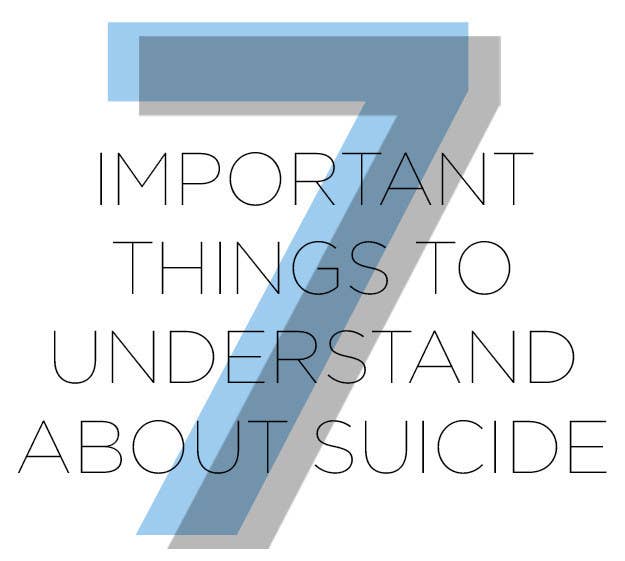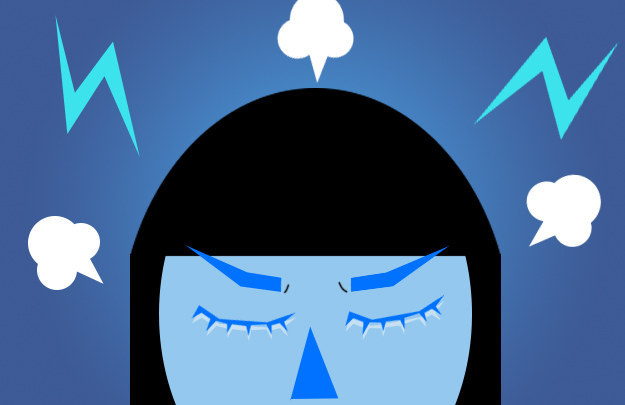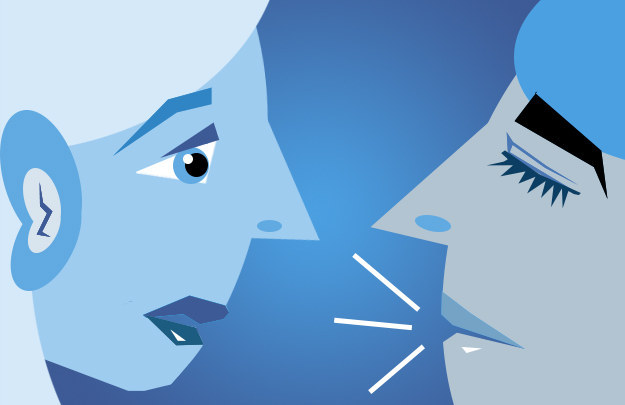
1. Certain risk factors are common among those who commit suicide.
The most prevalent of these is mental illness.
"About 60% of [people who commit suicide] have depression, and another common diagnosis is alcohol and substance abuse," says Dr. Susan G. Kornstein, Professor of Psychiatry and Executive Director of the Institute for Women's Health at Virginia Commonwealth University. It is also more common among men than women; nearly four times as many men as women take their lives, despite a greater number of suicide attempts in women. Dr. Kornstein attributes this to the tendency of men to use more lethal methods, and a reluctance to seek professional help for depression.
Other factors include family history of suicide, access to lethal means, loss of a loved one, eating disorder, aggression, unemployment, social isolation, prolonged illness, and previous suicide attempts.
2. Many people who are considering suicide show warning signs.
Sometimes it's a change in behaviors or routine. "They may start isolating themselves or losing interest in activities they enjoy," says Dr. Scott Krakower, child and adolescent psychiatrist at Zucker Hillside Hospital. That shift can mean an increase in risky or reckless behaviors, according to Dr. Kornstein, including more use of alcohol and/or drugs. There might be recognizable, dramatic mood shifts: agitation, more volatile anger. Sometimes, the person will make preparations, giving belongings away to friends and family.
These signals are also apparent in conversation. Has he mentioned feeling trapped; has she expressed hopelessness? According to Dr. David Brent, professor of psychiatry and leading suicide researcher at University of Pittsburgh School of Medicine, a person at risk for suicide might fixate on his death or make comments about being "a burden" to those around them.

3. Talking openly with a loved one about suicide decreases the risk — not the opposite.
Don't be afraid to broach the topic with someone you fear is suicidal.
"A common myth is that bringing up suicide with a loved one may 'plant the seed' and make the person more likely to commit suicide," says Dr. Kornstein. "This is not true! In fact, by bringing up the topic, you may help save the person's life."
Acknowledge your concern, show your support, listen without judgment, and then discuss all of their options. "Most people who are suicidal do not want to die — they just want to end their pain, and they are unable to see alternatives to their problems."

4. But the best way to help someone you suspect is suicidal is to get them to a medical professional.
An open, honest conversation is always a good place to start — and Dr. Kornstein stresses the importance of talking "openly and freely about suicide" — but often the best thing a person can do is bring her loved one to a doctor.
"Many friends and families tend to feel as though they're 'ratting' out their loved one, but more times than not, the friends and family can't help the person and they risk their loved one acting on their suicide," says Dr. Ayesha Ashai, psychiatry specialist at Mercy Medical Center in Baltimore. "The best thing the concerned party can do is be supportive after they alert the proper health care provider, and to be there even if their loved one is upset with them for bringing them to the hospital, psychiatrist, etc. Knowing that you're not alone and that your family/friends still love you can make a world of a difference in recovery."
5. Treatment can take many different forms.
Since the causal factors of suicide are varied, so are the methods of recovery, and psychiatrist and author Dr. Carole Lieberman of UCLA's Neuropsychiatric Institute explains that there is a real lack of knowledge about what treatment looks like.
"Treatment can consist of psychotherapy, medication (mostly anti-depressants), and hospitalization if imminent suicidal thoughts or plans are present," she says, pointing specifically to confusion about anti-depressants, and the importance of pairing them with regular psychotherapy. "Anti-depressants alone cannot cure depression or suicidal thoughts."

6. The way we report suicide matters.
News of one suicide can sometimes increase the likelihood of others. It's referred to as "suicide contagion," and it means the public discussions surrounding suicide need to be approached with extreme care.
"Sometimes, media coverage of suicides may foster suicide contagion by glorifying the suicide," says Dr. Kornstein. "This can be prevented by instead focusing on the signs of suicidal behavior; the factors that may have led to the suicide, such as mental illness; ways to prevent suicide; and where to get help."
The National Institute of Mental Health recommends avoiding graphic images, sensationalist headlines, or explicit descriptions of the method.
7. Suicide is preventable.
For those who experience any of the common risk factors — and those around them — the fear is often that suicide is an ongoing, losing fight. This isn't the case.
Says Dr. Brent, "Suicide is not inevitable. Many suicides can be prevented. Most people who commit suicide have both a wish to live and a wish to die; we need to help strengthen the wish to live."
And, according to Dr. Ashai, life after treatment can be incredibly fruitful and positive. "A previous suicide attempt isn't a death sentence for an unhappy future," she says. "The best hope for a better future is positive coping skills, knowing when to ask for help, having social support, having someone that you can trust to be there in a time of need, and also finding a sense of purpose."
Those who are struggling should enlist the help of trusted friends or family, and reach out to any of resources at their disposal; Dr. Kornstein recommends community mental health agencies, private psychiatrists, primary care physicians, school counselors, religious leaders, or intervention hotlines like National Suicide Prevention Lifeline (800-273-TALK [8255]) or National Suicide Hopeline (800-SUICIDE [784-2433]).
